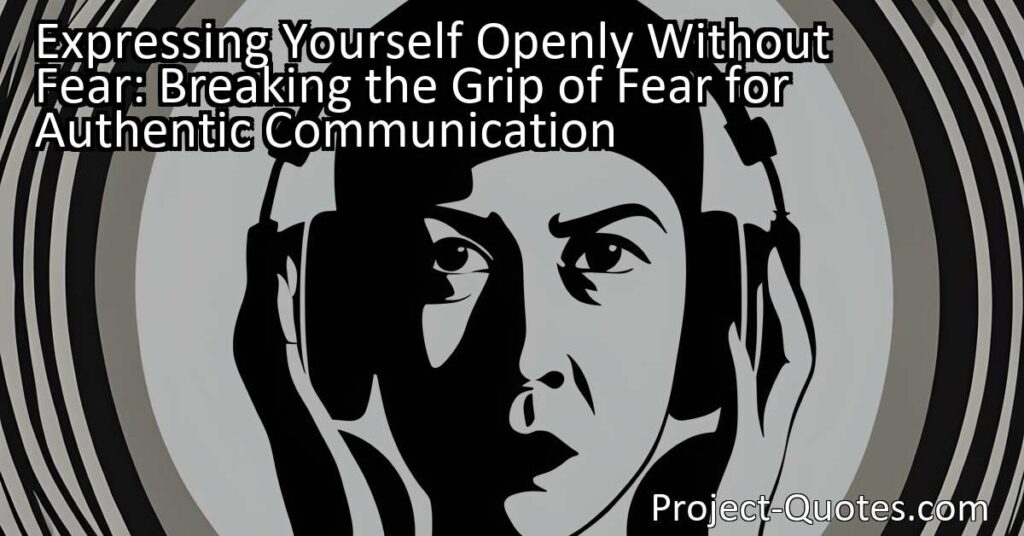Fear is not in the habit of speaking truth when perfect sincerity is expected, perfect freedom must be allowed nor has anyone who is apt to be angry when he hears the truth any cause to wonder that he does not hear it.
Tacitus
Expressing Yourself Openly Without Fear: Breaking the Grip of Fear for Authentic Communication In a world where conformity and fear of judgment often dominate, it can be challenging to express ourselves honestly. However, by creating spaces of understanding, embracing the value of truth, and cultivating sincere dialogue, we can break free from fear’s grasp and openly express ourselves without fear of judgment or consequence. This leads to personal growth and collective progress.
Table of Contents
- 1 Fear is not in the habit of speaking truth when perfect sincerity is expected, perfect freedom must be allowed nor has anyone who is apt to be angry when he hears the truth any cause to wonder that he does not hear it.
- 2 Tacitus
- 3 Meaning of Quote – Fear is not in the habit of speaking truth when perfect sincerity is expected, perfect freedom must be allowed nor has anyone who is apt to be angry when he hears the truth any cause to wonder that he does not hear it.
- 4 Freely Shareable Quote Image
- 5 Related
Meaning of Quote – Fear is not in the habit of speaking truth when perfect sincerity is expected, perfect freedom must be allowed nor has anyone who is apt to be angry when he hears the truth any cause to wonder that he does not hear it.
Fear is a powerful emotion that has the ability to cloud our judgment and hinder us from seeing the truth. As Tacitus so aptly stated, “Fear is not in the habit of speaking truth when perfect sincerity is expected.” When we are driven by fear, whether it be fear of judgment, rejection, or failure, we often find ourselves holding back from expressing our true thoughts and feelings. We become hesitant to speak with full sincerity, afraid of the potential consequences that may follow. However, Tacitus also emphasizes that in order for perfect sincerity to be achieved, “perfect freedom must be allowed.”
In today’s complex and interconnected world, where individuals are constantly bombarded with opinions, judgments, and societal expectations, it can be challenging to openly express oneself without fear of backlash or criticism. We live in a society where conformity is often encouraged, leading many to suppress their authentic selves in order to fit into the molds society has created. It is in this restrictive environment that fear grasps hold and prevents individuals from speaking their truth.
But why is it that fear inhibits our ability to speak honestly? One reason lies in our innate desire for acceptance and belonging. We fear the possibility of rejection or judgment from others, causing us to edit or hide our true thoughts and feelings. This fear of not being accepted or fitting in can manifest in various aspects of our lives, from personal relationships to academic and professional settings. Tacitus acknowledges this truth when he highlights that “anyone who is apt to be angry when he hears the truth [does not] have any cause to wonder that he does not hear it.”
Anger is another emotion closely tied to fear, one that can quickly surface when confronted with an uncomfortable truth. Many people struggle to handle criticism, whether it is constructive or not, often reacting with defensive anger. Tacitus understands this human tendency and suggests that those who react angrily to the truth may not be surprised when they do not hear it. This creates a cycle wherein fear inhibits the expression of truth and honesty, perpetuating misunderstanding and inhibiting personal growth.
However, Tacitus also emphasizes the importance of allowing “perfect freedom” in order to foster sincerity. True freedom goes beyond the absence of physical restraints and extends to an environment where individuals feel safe to express themselves authentically. It is in such an environment that fear loses its grip, allowing for the clear and honest communication of ideas and thoughts.
Creating this atmosphere of freedom can be a challenging task, as it requires a collective effort to build a society that values and respects diverse perspectives. It demands the willingness to listen, not only to the voices that align with our own beliefs but also to those that challenge our assumptions. It is through this openness and acceptance that we can begin to dismantle the fear that grips our ability to speak the truth.
In a world where fear often dominates our decision-making processes, it is crucial to acknowledge the power it holds over our lives. Fear limits us, constrains us, and stops us from embracing our true selves. It is only by recognizing and confronting this fear head-on that we can begin to break free from its grasp. We must strive to create spaces of understanding and empathy, where individuals feel empowered to express themselves without fear of judgment or consequence.
Moreover, it is essential to cultivate a mindset that embraces the value of truth, even when it may be uncomfortable or challenging to hear. Honest and open communication acts as a catalyst for personal growth and collective progress. By embracing the truth and encouraging sincere dialogue, we can foster relationships and communities that thrive on transparency and mutual respect.
In conclusion, fear has a way of distorting our perception of truth and hindering our ability to express ourselves sincerely. As Tacitus reminds us, fear is not inclined to speak the truth when sincerity is expected. However, true freedom allows for the dismantling of fear’s grip, creating spaces where individuals can openly express themselves without fear of judgment or retribution. By recognizing the power of fear and actively working to overcome it, we can foster environments that value and encourage sincere communication, paving the way for personal growth and collective progress.
I hope this quote inspired image brings you hope and peace. Share it with someone who needs it today!


